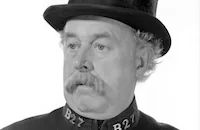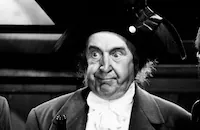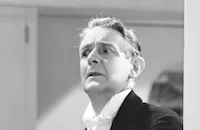The Bishop Misbehaves

Brief Synopsis
Cast & Crew
E. A. Dupont
Edmund Gwenn
Maureen O'sullivan
Lucile Watson
Reginald Owen
Dudley Digges
Film Details
Technical Specs

Synopsis
Donald Meadows, a young American studying architecture on a walking tour of England, is infatuated with pretty Hester Grantham, whom he meets in the cathedral at Broadminster. When he learns that she wants him to help her rob Guy Waller, a man who has cheated her father out of a valuable patent on one of his inventions, he thinks she is joking, but reluctantly agrees when she promises to go ahead anyway. The plan, which includes Collins, Waller's chauffeur, "Red," the bartender at the Red Lion Inn, and "Frenchy," a henchman they find in Limehouse, goes off perfectly until the Bishop of Broadminster and his sister Emily accidentally become involved. The bishop, who is devoted to detective novels, thrives on the adventure, as does his sister. The bishop finds and takes possession of the jewels and documents which the gang steals, then waits for them to come to his home to retrieve them. During a night of adventure and intrigue, the gang, Waller, and the bishop match wits until Donald and the bishop, with the help of Millie, Waller's wife, force Waller to give Hester money for her father's patent. Donald and Hester, having decided that they are in love, retire from the crime business, the other thieves are able to sneak away, and the bishop, realizing that his thirst for adventure has caused too much trouble, burns all of his detective stories.

Director
E. A. Dupont
Cast

Edmund Gwenn

Maureen O'sullivan

Lucile Watson

Reginald Owen

Dudley Digges

Norman Foster
Lilian Bond

Melville Cooper
Robert Greig
Charles Mcnaughton

Etienne Girardot

Ivan Simpson
Lumsden Hare

Leonard Carey
Charles Coleman
William Austin
Orrin Burke
Crew
Cedric Gibbons
Leon Gordon
Monckton Hoffe
Harry Mcafee
James E. Newcom
Douglas Shearer
Dolly Tree
James Van Trees
Edward Ward
Lawrence Weingarten
Edwin B. Willis

Film Details
Technical Specs

Quotes
Trivia
The play originally opened in New York on 20 February 1935 and ran 121 performances. Walter Connolly played the bishop and Jane Wyatt and 'Marshal, Alan' were the romantic leads.
Notes
In the opening credits, the principal actors are introduced by film clips and written descriptions establishing their characters, but the order differs from the end credits. Reginald Owen is the first introduced by "This is the villain who stole the papers." Next comes Maureen O'Sullivan followed the line "But our heroine is not going to take it sitting down," followed by Norman Foster as "Our hero who came to England for peace and quiet." Then Edmund Gwenn is introduced as "The Bishop of Broadminster!," followed by Lucille Watson, described as "His sister, fourteen times president of the Primrose League." End credits appear as shown in the above cast list, with Gwenn billed first. In the Broadway production of the play upon which the film is based, Waltor Connolly played the bishop and Jane Wyatt and Alan Marshall played the romantic leads. According to news items in Hollywood Reporter, Connolly was originally considered for the role in the film, as were Charles Laughton and Frank Morgan. Edna Mae Oliver was originally cast in the role of Lady Emily, and Ida Lupino was cast as Hester. One Hollywood Reporter news item noted that the English-born Lupino was sought from Warner Bros. for the picture but was then turned down because she had lost her English accent. Actors Clyde Cook, Andy Clyde, William Stack and Iris Lee were mentioned in a production article on the film, however, their participation in the released film has not been confirmed. According to a news item in Hollywood Reporter in October 1935, when the film was released in England the title was changed to The Bishop's Misadventures. The item notes that British censors did not approve of the original title because "Bishops do not misbehave." This film marked Edmund Gwenn's American motion picture debut.













